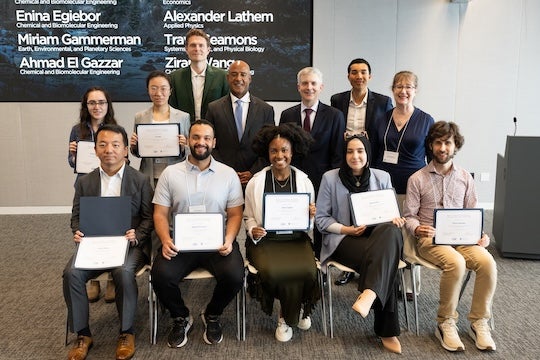On Sept. 4, the Rice Sustainability Institute (RSI) hosted a reception to introduce the inaugural cohort of the Rice Chevron Energy Graduate Fellowship. Held at the Ralph S. O’Connor Building for Engineering and Science, the event brought together more than 50 attendees to celebrate this new initiative. Funded by Chevron, the fellowship provides $10,000 each to 10 Rice graduate students for the 2024-25 academic year, supporting their groundbreaking research in energy-related fields.

Rice President Reginald DesRoches opened the event by emphasizing the importance of the collaboration. “This exciting new partnership between the RSI and Chevron represents a significant step forward in our shared commitment to advancing sustainable energy solutions,” he said. “Through our combined efforts, we are not only empowering our students but also contributing to a more sustainable and innovative future.”
The fellowship recipients are researching solutions to some of the world’s most pressing energy challenges, from recycling lithium-ion batteries to producing eco-friendly hydrogen alternatives to fossil fuels. Their work focuses on creating real-world, scalable solutions to transform the energy landscape.
Chris Powers, vice president of carbon capture, utilization and storage and emerging at Chevron New Energies and a Rice alumnus, underscored the importance of innovation. “I’m excited to support emerging leaders like you all in this room, who are focused on scalable, innovative solutions because the world needs them,” he said. “Innovation and collaboration across sectors and borders will be key to unlocking the full potential of lower carbon energies. And it’s groups like you, our newest Chevron Fellows, that can help move the needle when it comes to translating, or evolving, the energy landscape for the future.”

Ramamoorthy Ramesh, executive vice president for research at Rice, spoke via Zoom about the broader vision behind the fellowship. “These Chevron Fellows will question what exists today and discover the new tomorrow,” he said. “We want to be very good citizens, very good partners with Chevron, and do what is right for the planet.”
Carrie Masiello, director of the RSI and the W. Maurice Ewing Professor in Earth, Environmental and Planetary Sciences, presented each fellow with a certificate during the ceremony. This year’s Chevron Fellows include:
-
Xi Chen, a doctoral student in materials science and nanoengineering, uses microwave-assisted techniques to recycle lithium-ion batteries sustainably.
-
Enina Egiebor, a doctoral student in chemical and biomolecular engineering, works on solar-driven technologies to produce green hydrogen, an alternative to fossil fuels.
-
Miriam Gammerman, a doctoral student in Earth, environmental and planetary sciences, studies soil minerals’ role in the global carbon cycle to improve carbon storage.
-
Wesley Hungbui, an MBA student, develops financial models to encourage investment in sustainable energy projects.
-
Alexander Lathem, a doctoral student in applied physics, researches carbon-free methods to produce ammonia, a key agricultural fertilizer.
-
Ziran Wang, a doctoral student in civil and environmental engineering, studies power grid resilience in response to natural disasters and system failures.

Other fellows include Ahmad El Gazzar and Zina Deriche, who are focusing on renewable fuels and carbon-capture technologies; Travis Seamons, who is working on biological systems to sequester carbon dioxide; and Stan Kannegieter’s research highlights the potential of soil organic carbon sequestration on agricultural land if we remove the additionality constraint.
“This fellowship supports students working on a wide range of topics related to scalable innovations in energy production that will lead to the reduction of carbon dioxide emissions,” said Masiello, who highlighted the fellowship’s diverse group of applicants, spanning 10 departments and four schools at Rice. “It’s important that we recognize the importance of intellectual diversity to the kind of problem-solving we have to do as we accomplish the energy transition.”
For more information on the Rice Chevron Energy Graduate Fellowship and the research being conducted by this year’s recipients, please visit the website.

